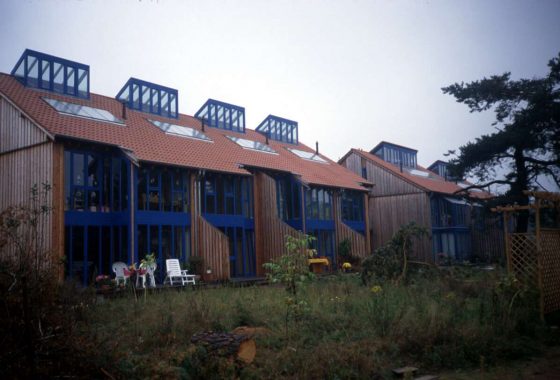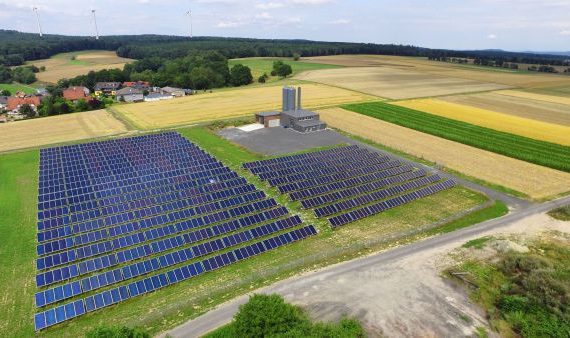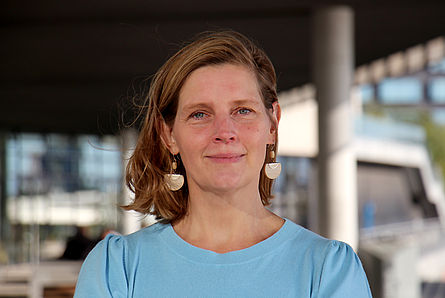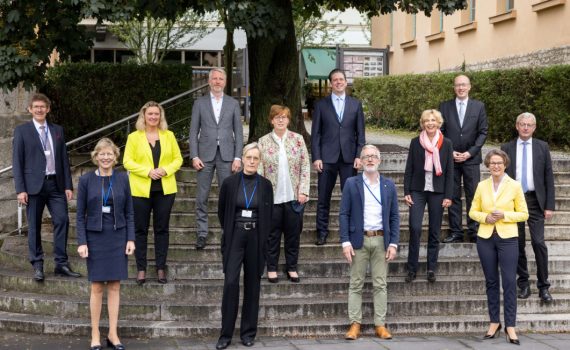Kategorie für Blog: Ecology
 With the portal https://energiewendedörfer.de the University of Kassel and Georg-August-Universität Göttingen will present the initial results from the joint project "Innovative concepts and business models for sustainable bioenergy villages - climate-friendly, democratic, citizen-centred". In particular, concepts are being developed for bioenergy and biogas plants that can enable continued economic operation after the current 20-year EEG phase.
With the portal https://energiewendedörfer.de the University of Kassel and Georg-August-Universität Göttingen will present the initial results from the joint project "Innovative concepts and business models for sustainable bioenergy villages - climate-friendly, democratic, citizen-centred". In particular, concepts are being developed for bioenergy and biogas plants that can enable continued economic operation after the current 20-year EEG phase.
 On the occasion of the meeting of EU Ministers for Urban Development and Territorial Cohesion on the "New Leipzig Charter", Daniela Wagner, spokesperson for urban development for Alliance 90/The Greens in the German Bundestag, explains:
We welcome the "New Leipzig Charter". Without the transformative power of cities and the ideas and drive of their residents, we will not be able to overcome the challenges of the climate crisis. Nevertheless, the Charter contains significant gaps. The guiding principle of the resilient city is missing. The development of robust and resilient cities is important in order to better assess risks and recognise and prevent dangers in good time. The guiding principle of the healthy city is also not mentioned - despite the heatwaves caused by the climate crisis, a never-ending stream of air pollutants from fossil fuelled combustion engines and the current challenge of a global pandemic.
On the occasion of the meeting of EU Ministers for Urban Development and Territorial Cohesion on the "New Leipzig Charter", Daniela Wagner, spokesperson for urban development for Alliance 90/The Greens in the German Bundestag, explains:
We welcome the "New Leipzig Charter". Without the transformative power of cities and the ideas and drive of their residents, we will not be able to overcome the challenges of the climate crisis. Nevertheless, the Charter contains significant gaps. The guiding principle of the resilient city is missing. The development of robust and resilient cities is important in order to better assess risks and recognise and prevent dangers in good time. The guiding principle of the healthy city is also not mentioned - despite the heatwaves caused by the climate crisis, a never-ending stream of air pollutants from fossil fuelled combustion engines and the current challenge of a global pandemic.

 The German Solar Energy Society e.V. (DGS) and the energy advice service of the consumer advice centre have been cooperating with each other since 1 December 2020. Consumer enquiries from both institutions are answered by the energy advisors of the consumer advice centre. In return, the DGS trains the advisors of the consumer advice centre in the subject area of plug-in solar devices.
The German Solar Energy Society e.V. (DGS) and the energy advice service of the consumer advice centre have been cooperating with each other since 1 December 2020. Consumer enquiries from both institutions are answered by the energy advisors of the consumer advice centre. In return, the DGS trains the advisors of the consumer advice centre in the subject area of plug-in solar devices.
 The ecological model settlement on a former barracks site in Munich sets new standards in timber construction. Various timber construction methods and building types up to seven storeys are being tested side by side in eight building projects with the aim of a final scientific evaluation. Timber frame, timber frame and timber hybrid construction methods are being used.
The ecological model settlement on a former barracks site in Munich sets new standards in timber construction. Various timber construction methods and building types up to seven storeys are being tested side by side in eight building projects with the aim of a final scientific evaluation. Timber frame, timber frame and timber hybrid construction methods are being used.
 The state of Lower Saxony has launched a new funding programme for battery storage systems. The funding guideline was published in the Lower Saxony Ministerial Gazette on 21 October. Applications can be submitted to the NBank with immediate effect.
The subsidy of up to 40 per cent of the net investment costs of a battery storage system applies in connection with the new construction or expansion of PV systems (at least 4 kWp). In addition to natural persons, grant recipients can also be companies, legal entities, local authorities and many others.
The state of Lower Saxony has launched a new funding programme for battery storage systems. The funding guideline was published in the Lower Saxony Ministerial Gazette on 21 October. Applications can be submitted to the NBank with immediate effect.
The subsidy of up to 40 per cent of the net investment costs of a battery storage system applies in connection with the new construction or expansion of PV systems (at least 4 kWp). In addition to natural persons, grant recipients can also be companies, legal entities, local authorities and many others.
Around 60 percent of the resources used in Berlin are processed in the construction industry. This contrasts with millions of tonnes of building rubble and construction site waste. Every year, 2.2 million tons of primary raw materials are already saved in civil engineering and building construction in Berlin through the use of quality-assured secondary raw materials. But Berlin does not intend to stop there. By 2030, a further 1.4 million tonnes of primary materials are to be replaced by secondary raw materials each year.
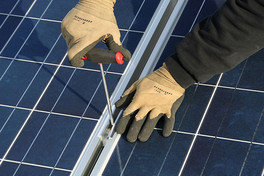 "To be climate neutral by 2050, we not only need to make additional investments in green and innovative technologies of the future. Above all, we also need a shift from existing investments in 'brown' raw materials such as coal, oil and gas to 'green' climate-friendly technologies. The phase-out of fossil fuels must be global and rapid, in line with the goals of the World Climate Conference. Only in this way can we realistically achieve the climate protection goals. Churches, municipalities and also companies are setting new standards here and demonstrating the feasibility of the changeover in both ecological and economic terms," said Environment Minister Ulrike Höfken today at the event "Divestment and Sustainable Finance", which took place during the Climate Protection Weeks in Rhineland-Palatinate.
"To be climate neutral by 2050, we not only need to make additional investments in green and innovative technologies of the future. Above all, we also need a shift from existing investments in 'brown' raw materials such as coal, oil and gas to 'green' climate-friendly technologies. The phase-out of fossil fuels must be global and rapid, in line with the goals of the World Climate Conference. Only in this way can we realistically achieve the climate protection goals. Churches, municipalities and also companies are setting new standards here and demonstrating the feasibility of the changeover in both ecological and economic terms," said Environment Minister Ulrike Höfken today at the event "Divestment and Sustainable Finance", which took place during the Climate Protection Weeks in Rhineland-Palatinate.
 Since April 2020, the Öko-Institut has been conducting research into how urban neighbourhoods can be sustainably transformed, using two neighbourhoods in the swarming city of Darmstadt as examples, in the project Transformative Strategies for Integrated Neighbourhood Development (TRASIQ 2). The Federal Ministry of Education and Research is funding the project, which is led by the Öko-Institut and involves the City of Darmstadt, the Institute for Regional and Urban Development Research (ILS) and the "Team Ewen" agency.
Since April 2020, the Öko-Institut has been conducting research into how urban neighbourhoods can be sustainably transformed, using two neighbourhoods in the swarming city of Darmstadt as examples, in the project Transformative Strategies for Integrated Neighbourhood Development (TRASIQ 2). The Federal Ministry of Education and Research is funding the project, which is led by the Öko-Institut and involves the City of Darmstadt, the Institute for Regional and Urban Development Research (ILS) and the "Team Ewen" agency.
Mobility, heat and living space
The project focuses on the research topics of mobility, heat supply and efficient use of living space. Heat supply is an important key to climate-friendly living. How and where, for example, can district heating be expanded in existing properties? How can we increase the share of renewable energies in the heat supply? The size of the living space also contributes to how environmentally friendly a person lives. What needs to be done to ensure that people have the living space they need in their particular phase of life through intelligent apartment swaps? How can neighbourhoods be redesigned so that residents can organise their mobility ecologically? With the gradual dismantling of ten particularly climate-damaging subsidies in the energy, transport and agricultural sectors, Germany could generate up to 46 billion euros in revenue annually. This is the result of a new study by the "Forum Ökologisch-Soziale Marktwirtschaft" commissioned by Greenpeace.
With the gradual dismantling of ten particularly climate-damaging subsidies in the energy, transport and agricultural sectors, Germany could generate up to 46 billion euros in revenue annually. This is the result of a new study by the "Forum Ökologisch-Soziale Marktwirtschaft" commissioned by Greenpeace.
 Dr. Kirsten David, a researcher at HafenCity University (HCU) Hamburg, has developed an innovative method for determining rent increases after energy efficiency measures: By means of functional cost splitting, rent increases become appropriate and comprehensible. The planning of the energetic measures is also ecologically optimized. For her dissertation entitled "Functional Cost Splitting for the Determination of Rent Increases after Energy Efficiency Measures", the scientist today receives the "BUND Research Award 2020". With the research award, the Bund für Umwelt- und Naturschutz (BUND) honors scientific work on sustainable development.
Dr. Kirsten David, a researcher at HafenCity University (HCU) Hamburg, has developed an innovative method for determining rent increases after energy efficiency measures: By means of functional cost splitting, rent increases become appropriate and comprehensible. The planning of the energetic measures is also ecologically optimized. For her dissertation entitled "Functional Cost Splitting for the Determination of Rent Increases after Energy Efficiency Measures", the scientist today receives the "BUND Research Award 2020". With the research award, the Bund für Umwelt- und Naturschutz (BUND) honors scientific work on sustainable development.
Grant of 900 euros per charging point For charging stations at privately used parking spaces of residential buildings For owners and condominium owners' associations, for tenants and landlords The electricity must come 100 percent from renewable energies Applications for funding can be submitted to the Kreditanstalt für Wiederaufbau (KfW) from 24 November 2020. Information: […]
 Wohnungsbaugenossenschaft Neues Berlin and Berliner Stadtwerke have agreed on another joint tenant power project. Six solar power systems with an output of around 500 kilowatts are being built in the Mühlengrund housing estate in Hohenschönhausen. Tenants of more than 1,100 apartments will soon be able to benefit from green electricity from their own roofs.
Wohnungsbaugenossenschaft Neues Berlin and Berliner Stadtwerke have agreed on another joint tenant power project. Six solar power systems with an output of around 500 kilowatts are being built in the Mühlengrund housing estate in Hohenschönhausen. Tenants of more than 1,100 apartments will soon be able to benefit from green electricity from their own roofs.
 From 1 January 2021, climate-damaging fossil fuels will be subject to a price of 25 euros per tonne of CO2 is proven. This means that oil and diesel will become more expensive by 7.9 cents per litre, petrol by 7 cents per litre and natural gas by 0.6 cents per kilowatt hour. Citizens will be relieved of the additional costs, among other things, by a reduction in the price of electricity. The amendment, which had already been passed by the Bundestag on Thursday, also passed the Bundesrat today. The Fuel Emission Trading Act (BEHG) is designed to reduce CO2-price in the form of national certificate trading for the heating and transport sectors.
From 1 January 2021, climate-damaging fossil fuels will be subject to a price of 25 euros per tonne of CO2 is proven. This means that oil and diesel will become more expensive by 7.9 cents per litre, petrol by 7 cents per litre and natural gas by 0.6 cents per kilowatt hour. Citizens will be relieved of the additional costs, among other things, by a reduction in the price of electricity. The amendment, which had already been passed by the Bundestag on Thursday, also passed the Bundesrat today. The Fuel Emission Trading Act (BEHG) is designed to reduce CO2-price in the form of national certificate trading for the heating and transport sectors.
 Glaciers are melting, sea levels are rising, heat waves and heavy rainfall are increasing: The consequences of climate change are visible and tangible worldwide, and the window of opportunity to act is shrinking. In order to significantly limit the global effects of climate change, the emission of greenhouse gases on earth must be drastically reduced. The agreement reached by the international community in Paris in 2015 sets the goal of limiting global warming to well below 2 degrees Celsius, but preferably to 1.5 degrees Celsius. Now, the Wuppertal Institute presented a study with possible cornerstones that can help to achieve the 1.5 degree target by 2035. The study shows that a climate-neutral energy system by 2035 is very ambitious, but in principle feasible, provided that all possible strategies from today's perspective are bundled. This requires, above all, bringing forward and intensifying measures that are described in many studies as necessary to achieve greenhouse gas neutrality by 2050.
Glaciers are melting, sea levels are rising, heat waves and heavy rainfall are increasing: The consequences of climate change are visible and tangible worldwide, and the window of opportunity to act is shrinking. In order to significantly limit the global effects of climate change, the emission of greenhouse gases on earth must be drastically reduced. The agreement reached by the international community in Paris in 2015 sets the goal of limiting global warming to well below 2 degrees Celsius, but preferably to 1.5 degrees Celsius. Now, the Wuppertal Institute presented a study with possible cornerstones that can help to achieve the 1.5 degree target by 2035. The study shows that a climate-neutral energy system by 2035 is very ambitious, but in principle feasible, provided that all possible strategies from today's perspective are bundled. This requires, above all, bringing forward and intensifying measures that are described in many studies as necessary to achieve greenhouse gas neutrality by 2050.
 Franklin Village", one of the first large-scale socially and ecologically developed residential projects in Germany, is to be built on the "Franklin" conversion site in Mannheim. The idea is to build a quarter in timber construction that claims to be ecologically and socially sustainable. The project developers will celebrate the groundbreaking ceremony in mid-September with an artistically designed parade of diversity.
Franklin Village", one of the first large-scale socially and ecologically developed residential projects in Germany, is to be built on the "Franklin" conversion site in Mannheim. The idea is to build a quarter in timber construction that claims to be ecologically and socially sustainable. The project developers will celebrate the groundbreaking ceremony in mid-September with an artistically designed parade of diversity.
 Solarserver reports on the world's largest solar heating plant, which has been in operation in China since 2016. It consists of parabolic trough collectors.
On the roof of a XuChen factory building next to the company headquarters are 22,000 m2 collector area, a further 71,000 m2 collector area are implemented as ground-mounted systems. Together they deliver an output of 65 MWth. With concentrating collectors, it would thus be the largest solar heating plant of its kind. An even larger one is the Danish Silkeborg plant (110 MWth)which, however, is equipped with a different collector technology.
For comparison: the largest German solar thermal system that supplies a settlement, neighbourhood or district currently has just 14,800 m²
Solarserver reports on the world's largest solar heating plant, which has been in operation in China since 2016. It consists of parabolic trough collectors.
On the roof of a XuChen factory building next to the company headquarters are 22,000 m2 collector area, a further 71,000 m2 collector area are implemented as ground-mounted systems. Together they deliver an output of 65 MWth. With concentrating collectors, it would thus be the largest solar heating plant of its kind. An even larger one is the Danish Silkeborg plant (110 MWth)which, however, is equipped with a different collector technology.
For comparison: the largest German solar thermal system that supplies a settlement, neighbourhood or district currently has just 14,800 m²
 Hydrogen is an important alternative for sectors stuck in the fossil fuel economy. As national governments and European parliamentarians negotiate the EU's hydrogen strategy, EASAC issues a new commentary. "Hydrogen can help reduce our dependence on fossil fuels," says William Gillett, Director of EASAC's Energy Programme. "But the climate benefits are limited if we use fossil fuels to produce it - even with carbon capture and storage. The EU must put an end to fossil fuel subsidies. The rapidly growing demand for hydrogen must be met by a massive increase in electricity generation from renewables, together with certified imports from third countries."
Hydrogen is an important alternative for sectors stuck in the fossil fuel economy. As national governments and European parliamentarians negotiate the EU's hydrogen strategy, EASAC issues a new commentary. "Hydrogen can help reduce our dependence on fossil fuels," says William Gillett, Director of EASAC's Energy Programme. "But the climate benefits are limited if we use fossil fuels to produce it - even with carbon capture and storage. The EU must put an end to fossil fuel subsidies. The rapidly growing demand for hydrogen must be met by a massive increase in electricity generation from renewables, together with certified imports from third countries."
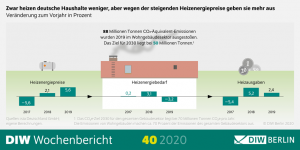 Annual DIW Heat Monitor based on data from energy service provider ista Deutschland GmbH: Heating energy demand in residential buildings declines again for the first time since 2015 - Rising prices, however, cause heating expenditure to increase by 2.4 percent - CO2emissions have fallen by 21 percent overall since 2010, but by only 2.6 percent when adjusted for temperature - Energy-efficient renovation in residential buildings almost stagnant
Annual DIW Heat Monitor based on data from energy service provider ista Deutschland GmbH: Heating energy demand in residential buildings declines again for the first time since 2015 - Rising prices, however, cause heating expenditure to increase by 2.4 percent - CO2emissions have fallen by 21 percent overall since 2010, but by only 2.6 percent when adjusted for temperature - Energy-efficient renovation in residential buildings almost stagnant
 "Solar energy is a fundamental pillar of the energy transition. In order to further support this and to achieve our goal - a complete power supply from renewable energies by 2030 - we are further expanding our successful solar offensive: In addition to expanding the solar storage programme, which is in high demand, we are currently developing a solar register for Rhineland-Palatinate. In addition, we will also promote solar carports, balcony plug-in modules, wall boxes or agro-PV projects in the future," announced Environment and Energy Minister Ulrike Höfken during the event under the motto "Solar Offensive Rhineland-Palatinate: Investments for Climate and Economy" as part of the series "Wednesdays in the MUEEF" in Mainz today.
"Solar energy is a fundamental pillar of the energy transition. In order to further support this and to achieve our goal - a complete power supply from renewable energies by 2030 - we are further expanding our successful solar offensive: In addition to expanding the solar storage programme, which is in high demand, we are currently developing a solar register for Rhineland-Palatinate. In addition, we will also promote solar carports, balcony plug-in modules, wall boxes or agro-PV projects in the future," announced Environment and Energy Minister Ulrike Höfken during the event under the motto "Solar Offensive Rhineland-Palatinate: Investments for Climate and Economy" as part of the series "Wednesdays in the MUEEF" in Mainz today.
Jury statement: "The WIR neighbourhood in Berlin is characterised not only by its high energy efficiency (KfW 40 standard) and the use of wood as a renewable raw material for the building construction, but also by the collaborative planning process, which led to different housing concepts and the integration of different social communities. Communal areas and shared facilities such as a residents' workshop, swimming pool, neighbourhood square and daycare centre enable a lively and diverse neighbourhood. This also includes a dementia residential community as well as organisations for youth work and refugee groups. The five apartment blocks were realised with a timber frame construction and the façade in timber panel construction. This resulted in flexible floor plans that offer good conversion options."
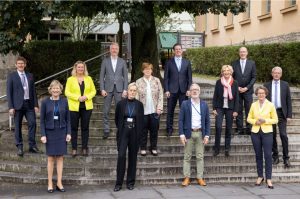 At their meeting in Weimar on 24 and 25 September, the construction ministers of the federal states adopted resolutions on social housing, the use of ecological building materials and the digitalisation of the building permit process, among other things.
The EU's plan to become involved in the area of public housing promotion as part of the new "InvestEU" fund was criticised. The federal government was therefore called upon to advocate a modification of the programme so that subsidies are only granted if the provisions of regional, national or federal funding regimes are observed, in particular if rent and occupancy restrictions are stipulated. The Chairman of the Conference of Building Ministers, Thuringia's Infrastructure Minister Benjamin-Immanuel Hoff, said: "Creating affordable housing in Germany remains an important task. The federal government must continue to provide at least the same level of funding. In order to make faster progress, we need more money in the system. The EU's commitment is therefore to be welcomed in principle. But we must ensure that the funds also reach social housing construction, and we agree that this can best be achieved through the established funding programmes of the federal states."
At their meeting in Weimar on 24 and 25 September, the construction ministers of the federal states adopted resolutions on social housing, the use of ecological building materials and the digitalisation of the building permit process, among other things.
The EU's plan to become involved in the area of public housing promotion as part of the new "InvestEU" fund was criticised. The federal government was therefore called upon to advocate a modification of the programme so that subsidies are only granted if the provisions of regional, national or federal funding regimes are observed, in particular if rent and occupancy restrictions are stipulated. The Chairman of the Conference of Building Ministers, Thuringia's Infrastructure Minister Benjamin-Immanuel Hoff, said: "Creating affordable housing in Germany remains an important task. The federal government must continue to provide at least the same level of funding. In order to make faster progress, we need more money in the system. The EU's commitment is therefore to be welcomed in principle. But we must ensure that the funds also reach social housing construction, and we agree that this can best be achieved through the established funding programmes of the federal states."
Following the interim results of the Housing Summit and the Building Land Commission, demands are being voiced by the scientific community: The still tight housing markets require the use of additional instruments by the federal and state governments. Otherwise, the turnaround towards affordable housing cannot be achieved.
Offensive for green electricity: Installation of 1,000 new photovoltaic systems and 2,000 charging points in Deutsche Wohnen neighbourhoods
"The building sector is responsible for around one third of all CO2-emissions in Germany. To achieve a climate-neutral building stock by 2050, the energy refurbishment of existing buildings alone is not enough," explains Michael Zahn, CEO of Deutsche Wohnen SE. "We also need to exploit the technological possibilities for CO2-Reduction to the fullest and open up the opportunity for our tenants to live sustainably." A study funded by the Federal Ministry of Agriculture determined the potential of hardwood as a substitute for coniferous wood. The results of the study are now available in a brochure published by the Fachagentur Nachwachsende Rohstoffe e. V. (FNR). There is considerable potential for hardwood to be used in industrial timber, but it cannot yet be a substitute for softwood in construction
A study funded by the Federal Ministry of Agriculture determined the potential of hardwood as a substitute for coniferous wood. The results of the study are now available in a brochure published by the Fachagentur Nachwachsende Rohstoffe e. V. (FNR). There is considerable potential for hardwood to be used in industrial timber, but it cannot yet be a substitute for softwood in construction
"The world's water resources are currently facing the greatest threat in the history of mankind," write aquatic ecologists in their recently published statement paper. More than one hundred professional societies of aquatic ecosystem research around the globe have signed the joint statement. In it, the researchers show the dramatic effects that climate change is having on aquatic ecosystems worldwide. They call for immediate concerted action by politics, business, science and society to halt the progress of climate change.
 As stated by EU Commission President Ursula von der Leyen in her State of the Union address announced, the European Commission today (Thursday) proposed that EU greenhouse gas emissions should fall by at least 55 percent by 2030 compared to 1990 levels. The previous target was 40 percent. The new target is based on a comprehensive impact assessment of the social, economic and environmental consequences. This shows that 55 percent less emissions is realistic and feasible. The new climate target will help support Europe's economic recovery from the coronavirus pandemic. It also demonstrates the EU's global leadership in the run-up to the next UN climate conference (COP26).
As stated by EU Commission President Ursula von der Leyen in her State of the Union address announced, the European Commission today (Thursday) proposed that EU greenhouse gas emissions should fall by at least 55 percent by 2030 compared to 1990 levels. The previous target was 40 percent. The new target is based on a comprehensive impact assessment of the social, economic and environmental consequences. This shows that 55 percent less emissions is realistic and feasible. The new climate target will help support Europe's economic recovery from the coronavirus pandemic. It also demonstrates the EU's global leadership in the run-up to the next UN climate conference (COP26).
CO2-Emissions should be reduced by 65 percent over the next ten years compared to 1990 in order to achieve climate neutrality - Energy system must be converted to 100 percent renewable energies by 2040 - Investment of 3,000 billion euros required to meet European Green Deal and Paris climate targets - German EU Council Presidency can ensure that Corona aid packages link economic stimulus with climate protection
Climate protection is important to over 80 percent of Germans - but this should not be reflected in higher rental costs. In order to increase the acceptance of energy-efficient renovations, Deutsche Wohnen has developed a model of how climate protection and social compatibility can come together. The "Concept for Socially Compatible Climate Protection in the Building Sector" aims to significantly increase the rate of refurbishment in existing buildings in order to achieve national climate protection targets. At the same time, an economic stimulus package worth billions is being initiated.
 30.06.2020 - 16 players in the German financial sector, with assets of more than €5.5 trillion and over 46 million customer connections in Germany, have signed a voluntary commitment to align their loan and investment portfolios in line with the goals of the Paris Climate Agreement. Through the agreed measurement, publication and target setting to reduce the emissions associated with the loan and investment portfolios, the financial sector intends to make a contribution to climate protection and support the sustainable and future-oriented further development of the economy. This brings the German financial centre one step closer to the goal set by the German government at the beginning of 2019 of making Germany one of the leading locations for sustainable finance.
30.06.2020 - 16 players in the German financial sector, with assets of more than €5.5 trillion and over 46 million customer connections in Germany, have signed a voluntary commitment to align their loan and investment portfolios in line with the goals of the Paris Climate Agreement. Through the agreed measurement, publication and target setting to reduce the emissions associated with the loan and investment portfolios, the financial sector intends to make a contribution to climate protection and support the sustainable and future-oriented further development of the economy. This brings the German financial centre one step closer to the goal set by the German government at the beginning of 2019 of making Germany one of the leading locations for sustainable finance.
The new version of the Bavarian Building Code will make it easier to build with wood in the future. In future, it can be used in all building classes. Schreyer: "With this, we are making wood significantly more attractive as a building material and thus making construction more sustainable." The Council of Ministers passed the amendment in its session today. Now it is the turn of the state parliament.
 At the proposal of the Federal Environment Ministry, the Federal Cabinet adopted the third German Resource Efficiency Programme (ProgRess III) on 17 June 2020. With this programme, the government aims to achieve an economical use of raw materials. Companies in particular are to use natural resources more efficiently along the entire value chain. Greater use is to be made of digital solutions to increase resource efficiency. The decision in favour of resource-saving products is to be made easier for citizens through improved information.
At the proposal of the Federal Environment Ministry, the Federal Cabinet adopted the third German Resource Efficiency Programme (ProgRess III) on 17 June 2020. With this programme, the government aims to achieve an economical use of raw materials. Companies in particular are to use natural resources more efficiently along the entire value chain. Greater use is to be made of digital solutions to increase resource efficiency. The decision in favour of resource-saving products is to be made easier for citizens through improved information.

